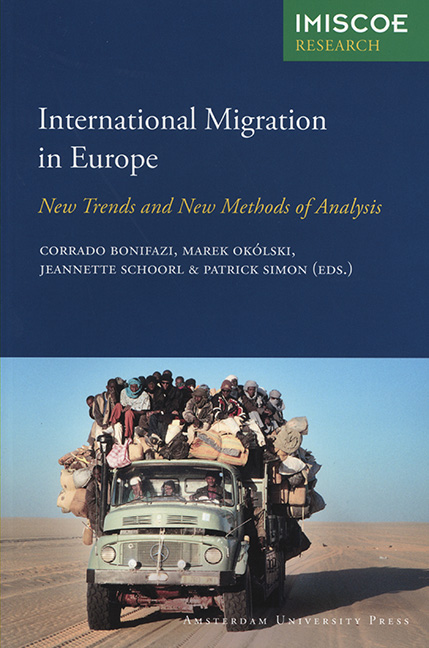Book contents
- Frontmatter
- Contents
- Preface
- 1 Introduction
- PART I NEW FORMS OF MIGRATION IN EUROPE
- PART II EVOLUTION OF REGIONAL PATTERNS OF INTERNATIONAL MIGRATION IN EUROPE
- PART III MEASURING INTEGRATION: IMMIGRANTS AND THE SECOND GENERATION
- PART IV SPECIAL SURVEYS IN INTERNATIONAL MIGRATION STUDIES
- List of Contributors
- Index
- Other IMISCOE Titles
9 - The Post-Enlargement Migration Space
Published online by Cambridge University Press: 22 June 2021
- Frontmatter
- Contents
- Preface
- 1 Introduction
- PART I NEW FORMS OF MIGRATION IN EUROPE
- PART II EVOLUTION OF REGIONAL PATTERNS OF INTERNATIONAL MIGRATION IN EUROPE
- PART III MEASURING INTEGRATION: IMMIGRANTS AND THE SECOND GENERATION
- PART IV SPECIAL SURVEYS IN INTERNATIONAL MIGRATION STUDIES
- List of Contributors
- Index
- Other IMISCOE Titles
Summary
Since its foundation the transnational experiment called the European Union has tried to provide a political form for the ancient idea of Europe. This has been attempted by establishing a set of rules opposing the entropy of the international system and setting up a common market, therefore continuing the process of political integration sanctioned by treaties. These rules have generated a dense network, which has grown up, surprisingly, beyond all proportions, entangling ‘goods and persons’ and at times delaying the overall growth of the system. The geopolitical space of the EU has expanded or decreased because of historical social factors and the political willingness, or not, of the ruling coalitions of its member states.
In more than 40 years of its recent history, Europe has been a divided entity reproducing variables of political thought and socioeconomic systems in contrast with each other: East and West, a planned economy against the free market, totalitarianism and democracy.
The collapse of the Soviet paradigm in 1991 and the ensuing gradual reunification of the European continent have not only forever altered a vision of the world, but they have also sparked movements of populations long appeased, thus making migration regimes and the impermeability of European borders subjects for discussion.
The idea proposed in this paper is the need to look at the transformations of the EU migration space in the period that starts in the 1980s, goes through the 1990s, until the decisive appointment of 1 May 2004, the day that sanctioned the fifth and most imposing EU enlargement. The last date is actually a starting point for the continent to look further and try to identify the empirical form and political features within today's migration scenario in the enlarged EU.
‘Enlargements’ and ‘restrictions’ in the European Union
Social phenomena and political processes, often complementary, have fuelled the enlargement of the common European space: the processes of globalisation and economic interdependence on one side together with the evident impossibility of adopting national immigration policies without externalising the control of borders.
The 1980s, the starting point of our discussion, saw an acceleration of the political union with the introduction of the concept of ‘variable geometry’ and the publication of the ‘White Book’ by the Delors Commission, which included detailed proposals for realising a common market.
- Type
- Chapter
- Information
- International Migration in EuropeNew Trends and New Methods of Analysis, pp. 179 - 196Publisher: Amsterdam University PressPrint publication year: 2008
- 1
- Cited by



